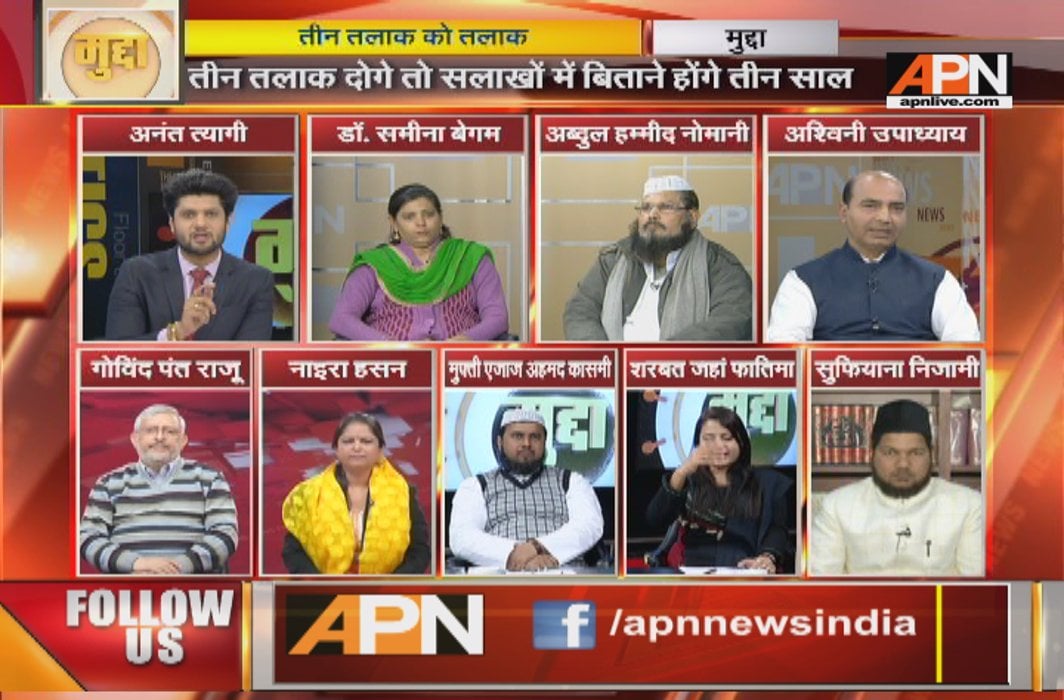Mudda panellists debate nitty-gritties of the law on anvil, question its necessity, some want modification of draft to cut short imprisonment, include scope of reconciliation
Asaduddin Owaisi of the All India Majlis-e-Ittehadul Muslimeen has issued a notice to the Lok Sabha opposing the introduction of the triple talaq bill in parliament after the All India Muslim Personal Law Board has expressed its objections to it. Thursday’s Mudda examined the reasons cited by them in rejecting the government move with Anant Tyagi anchoring the debate.
Participants included All India United Morcha leader Maulana Abdul Hameed Nomani, Darul Uloom Firangi Mahal spokesperson Sufiana Nizami, triple talaq victim Dr Sameena Begum, BJP spokesperson Ashwini Upadhyay, Congress spokesperson Sharvat Jahan Fatima, AIMPLB member Mufti Ejaz Ahmad Kazmi, social worker Naheera Hasan and APN consultant Govind Pant Raju. It must be noted, however, that Muslim women are overwhelmingly in favour of the bill and are actually in a celebratory mode over the issue.
Maulana Nomani opened the debate, opposing the bill on grounds that it hurt Muslim women’s rights. He said while a Muslim man has access to only one kind of talaq, a Muslim women can avail three kinds of talaq—khula (wherein she seeks divorce from her husband on condition of parting with her mehr), talaq-e-tahfeez (wherein she divorces her husband directly) and faskh (wherein she gets the marriage annulled). But the new bill will deny her those rights.
Sameena Begum responded to him saying save khula, the other forms of talaq had not been made actually accessible to women and khula required a third party for taking place.
Mufti Kazmi gave two reasons for opposing the bill. “Why need a law when those practising talaq-e-biddat is already in contempt of court? Besides, the bill uses a blanket term talaq, effectively banning all forms of divorce by Muslim men,” he said.
Upadhyay skirted the issue, saying under the Indian Penal Code, attempt to commit a crime was also a punishable offence, such as attempt to murder and attempt to rape. Hence an attempt to perform triple talaq was also being made punishable as divorcing a woman through triple talaq is like murdering her because one is hurting her dignity, he asserted.
Mufti Kazmi retorted, saying “the kind of dignity you are referring to is not covered by the law”.
Nizami raised the question of whether a man is still married to his wife after a failed talaq-e-biddat attempt. “Where does he return to after spending three years in jail? Who will take care of the wife financially while he is in jail?” he said.
To this, Upadhyay rightly said that Nizami was “confusing things unnecessarily”, but added that, if not sharia, all rights under articles 14, 15 and 21 had been taken care of by the bill. This led to some bickering over whether personal laws had been ignored or not by the bill as well as by the apex court.
Asked her views, Fatima, the Congress spokesperson, said that her party supported the bill but repeated Nizami’s query, playing a feeble devil’s advocate.
Reading between the lines, Upadhyay said, “If the husband repents and reconciles with the wife, he is free to do so. Banning of triple talaq effectively ends the evil practice of nikah halala where the wife had to marry another man and consummate the marriage with him if the couple decided to reconcile.” He hinted at the practice among mullahs and clerics in Uttar Pradesh taking money to offer themselves as husbands to such women.
The maulana, mufti and Nizami vociferously denied existence of any such practice.
Upadhyay then said, “If triple talaq cases are only three percent of divorces in your community as you said in the Supreme Court, why be so worried about the bill?
Surprisingly, Hasan, the female social worker objected to the bill in its present form on three counts. Hasan said, “This bill has emerged out of the struggle of Muslim women. But we have three reservations—(i) there should be scope for reconciliation, (ii) I am personally not in favour of any third party intervention, and (iii) the prison term for the offender is too long.”
Compiled by Sucheta Dasgupta


 India News23 hours ago
India News23 hours ago
 India News8 hours ago
India News8 hours ago
 India News8 hours ago
India News8 hours ago
 Latest world news8 hours ago
Latest world news8 hours ago
 India News2 hours ago
India News2 hours ago
 Cricket news2 hours ago
Cricket news2 hours ago
 Latest world news2 hours ago
Latest world news2 hours ago















